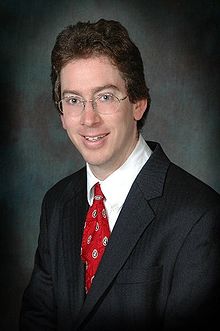Bryan Caplan
| Bryan Caplan | |
|---|---|
 |
|
| Born |
April 8, 1971 Northridge, California, United states |
| Nationality | United States |
| Website | bcaplan |
| Field | Economics |
| School or tradition |
Public Choice school |
| Influences | David D. Friedman, Michael Huemer, Murray Rothbard, Michael Spence, Julian Simon, Ludwig von Mises |
| Contributions | Rational Irrationality, Ideological Turing Test |
| Information at IDEAS / RePEc | |
Bryan Douglas Caplan (born April 8, 1971) is an American economist. Caplan is a professor of economics at George Mason University, research fellow at the Mercatus Center, adjunct scholar at the Cato Institute, and blogger for EconLog. He works in public choice theory and is interested in libertarian subjects. The bulk of Caplan's academic work is in public economics, especially public choice theory.
Caplan holds a B.A. in economics from the University of California, Berkeley, and a Ph.D. in economics from Princeton University. His thesis is titled "Three essays on the economics of government behavior."
The Myth of the Rational Voter: Why Democracies Choose Bad Policies, published in 2007, further develops the "rational irrationality" concept from Caplan's earlier academic writing. It draws heavily from the Survey of Americans and Economists on the Economy in making the argument that voters have systematically biased beliefs about many important economic topics. Caplan writes that rational irrationality is an explanation for the failure of democracy. The book was reviewed in the popular press, including the Wall Street Journal, the New York Times, and the New Yorker, as well as in academic publications such as the Journal of Libertarian Studies,Public Choice,Libertarian Papers, and The Independent Review. It received a scathing critique by Rupert Read in the European Review.
...
Wikipedia
